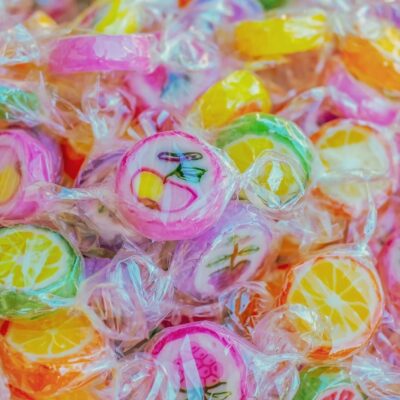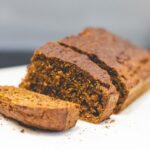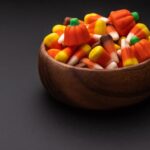No, candy is not safe for dogs. Candy contains sugar, which is bad for your dog’s health. Similarly, sugar-free candy generally contains xylitol, which is poisonous to dogs and lowers their blood sugar levels. Hence, keeping all types of candies away from your canine companion is best.

Caution: This food is generally considered risky by the veterinary community. Dogs should not eat this food and should be monitored for adverse effects.
| Food Safety | Exercise caution, avoid feeding |
| Nutritional Issues | Carbs from sugar, theobromine from chocolate, xylitol |
| Potential Risks | Xylitol poisoning, theobromine poisoning, weight gain, diabetes, pancreatitis |
| Poisoning Symptoms | Liver failure, hypoglycemia, seizures, vomiting, diarrhea, stomach issues |
How Many Candies are Unsafe for Dogs?
While a single lick might not harm your dog, avoid giving your canine companion any type of candy, including chocolate bars, mints, and hard candies. Furthermore, sugary Halloween treats like grape candy, raisin candy, nut candies, and candy corn are poisonous to dogs and can cause kidney failure.
What Makes Candy Unsafe for Dogs?
Candy has a lot of sugar, which can cause immediate health issues like stomach distress or long-term problems like obesity. Furthermore, the artificial sweetener xylitol, which is extremely harmful to dogs, is used in many sugar-free treats. Consuming xylitol causes low blood sugar levels, which can cause pancreatitis and the potentially fatal condition hypoglycemia. Lastly, if you feed your dog large amounts of chocolate candy, it could be fatal. Atypical heart rates, high blood pressure, frequent urination, digestive problems, and seizures are all caused by chocolate toxicity.
What to do if Your Dog Eats Too Many Candies
If your dog eats candy containing toxic toppings and ingredients, it would be best to monitor its health. For instance, if your dog eats chocolate candy, keep an eye out for signs of theobromine poisoning. If symptoms appear, take your pet to the doctor immediately.
Common Candy Ingredients
- Sugar-Too many sugary candies can lead to obesity in dogs.
- Vanilla-Vanilla is typically safe for dogs in moderation.
- Mint-Eating too many mints can lead to vomiting, diarrhea, and stomach issues in dogs.
- Raisins-Raisins contain tartaric acid and can lead to kidney failure in dogs.
- Xylitol-Xylitol is highly toxic for dogs and can be fatal.
- Chocolate-Like raisins and xylitol, chocolate poses the same threat to dogs. This is because it contains theobromine, which is highly toxic for dogs.
Frequently Asked Questions
-
Every candy contains a large amount of sugar and can be unsafe for dogs if consumed excessively. However, keeping your dog’s candy consumption under 10 grams will be safe.
-
If your dog eats unflavored candy, the worst thing that can happen is diarrhea or vomiting. However, if your dog eats chocolate, raisin, or sugar-free candy, you should take it to the vet immediately.
-
Yes, various types of candy can hurt your dog. These include candy containing raisins, chocolate, xylitol, macadamia nuts, and other toxic ingredients.







